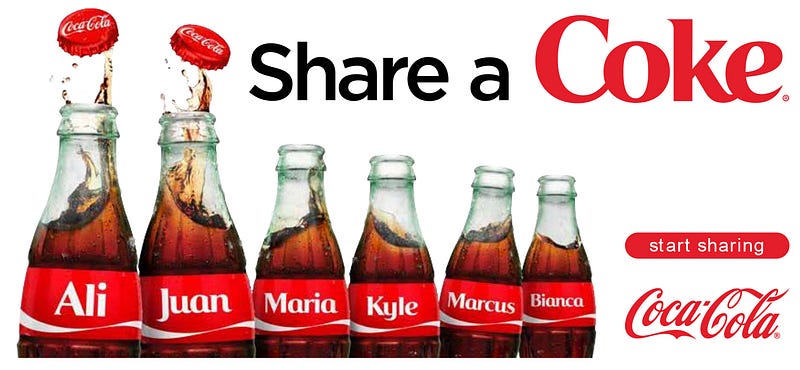You’re Not Using Your Customers’ Names Enough
You’re Not Using Your Customers’ Names Enough
In this weekly series, I opine on how language and content affect the way we understand the products and services around us. I do this for your entertainment and education (and, of course, to remind you that if you’re looking for a freelance copy, content, product, or technical writer… yada yada, hire me).
Have you ever wondered if you’d be a totally different person had you been given a different name?
Call me narcissistic, but whenever I write my name down on a form or someone writes it out in an email, I always drift off into a weird day-dream about having a different name.
There’s actually a large body of academic work focused on how our name can impact who we become, and there’s an equally large amount of evidence which proves the profound effects of using people’s names in persuasion.
I think that’s why I’ve been fascinated with a story from 2014 that surfaced again on Reddit this week past.
In one year, Coke generated a massive increase in sales worth tens of millions of dollars simply by adding one word to its bottles’ labels.
That word? Your name.
Wait, What Happened?
Back in 2014, Coca Cola debuted a US advertising campaign it called “Share A Coke”. You likely remember the campaign (which itself suggests how successful it was). Coke printed unique labels on its bottles with people’s names replacing the traditional “Coke” branding.

The campaign was further developed through 2014 (after having been tested first within Australia back in 2011) and continues to this day with different formats and seasonalities.
What Followed
The impact of the 2014 push was almost immediate.
People all over the US and Canada began the hunt for their own named bottle, and naturally, as is often the case these days, the documentation of that hunt made its way to social media en masse.
As if the self-indulgent hunt wasn’t enough, people actually began to buy up bottles for friends, too—particularly after Coke expanded the name pool to include colloquialisms like “Bro” and “Girlfriend”.
The two behaviours in parallel—the social media documentation and the “get one for a friend” activity—created an immense network effect that multiplied the impact of the campaign significantly.
And just when the campaign seemed to have run its course? Coke doubled-down and printed famous song lyrics on the bottles while getting the respective singers involved—to incredible effect. Selena Gomez’s participation alone resulted in the single most-liked Instagram post of all time.
The Result
The results were remarkable. The campaign’s inaugural year contributed to a 2% increase in sales, which amounts to something like a $90M revenue add.
What’s more, as The Atlantic wrote, the campaign “helped reverse more than 10 years of decline in Coke consumption in the U.S..”
Coke had deftly taken advantage of the increasingly-effective influencer marketing startegy, and the campaign went on to win awards.
The Takeaway
When I think about Coke’s success, I begin to believe that there’d be tremendous upside in more regularly using people’s names when writing about (and building) products.
When we write to prospects or customers, particularly when doing so at scale, it can be all too easy to forget that the people on the other end are people — people like you and I; people who are busy, who had a hard day, who maybe just had a fight with a boss or a significant other or got into a fender bender or lost their phone.
Indeed, those of us in bigger companies send emails out with nothing more than a “Hi $first_name $last_name” mail merge to thousands if not tens of thousands of customers every day. We have websites that are viewed every day by hundreds of thousands if not millions.
Mail merges are obvious, and generic messages are just that—generic. Yet, most of our communications reek of this abject impersonality.
We should be doing better; the Coke campaign makes it clear there is a reward for doing better.
Maybe that means we should have smaller target segments and send out more tailored blasts for our email communications. Maybe that means telling more and better customer stories, or letting customers make their own names and tell their own stories to the broader base, in our content blogs. Maybe that means hosting more intimate group webinars with fewer attendees and taking the time to talk to each attendee by name.
Names are super powerful, and even something as simple as the “shoutouts” that happen at the beginning of every HQ Trivia game create a cost-free virality that can provide immense ROI for the savvy product company.
I believe from the Coke campaign we should learn that there are huge rewards to be had by taking more time to connect with our customers on a personal level — calling out to them by name, if you will.
(Shameless plug: hence why I’m so excited by FreshBooks’ “I Make A Living” event series.)
I’m sure you’d probably agree, Dave—as would Vanessa and Kunwar.
But what about you, Adam? Avrum? Lindsay? Jill? Jakub? Amber? Cliff? Jon? Annie? Melissa? Anton? Matt? Max? Maciek? Erica? Zak? Paula? Danielle? Dimitra?
Wouldn’t you say the same thing, Anthony? And you, Joseph? Marco? Alex? Davi? Ailsa? Marshall? Andrew? Neil? Rob? Eric? Mel? Jesse? Karlo? Keith? Marino? Derek? Mo? Tiff? Jennifer? Niki?
I mean, I know for sure that Kristin, Kim, Jeff, Gordon, both Brian and Bryan, Lavinia, Sam, Nick, Alan, Ken, Asim, Chris, and James agree.
Do you?
TL;DR
Talk to your customers and prospects as you would the closest people in your life: by name. If psychology teaches us anything, the results of doing so will be spectacular.
What about you? Any lessons you’ve drawn from this? Respond away. And if you’d like to learn more about me or my business, visit www.frankcaron.com.